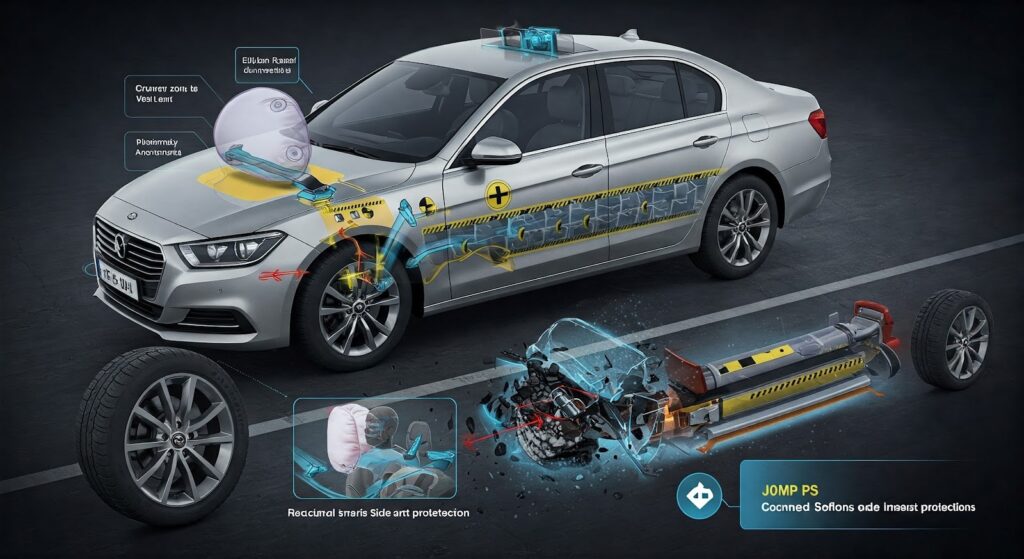Modern Car Safety: A Deep Dive Into Technology, Transparency, and Trust
Crash-tested. Airbag-ready. Lane-keeping. These are the buzzwords stamped on every new car ad. But safety today is deeper than sensor grids and steel frames. It’s a question of what came before.
A vehicle that’s been through three accidents, changed hands six times, or passed through auctions under salvage titles is not just a car-it’s a mystery. That’s why ownership history, registered owner data, and a proper vehicle history report matter. They help us drive into the future without dragging the dangers of the past.
You can go a step further and use advanced search tools like an engine lookup by vin to unlock critical information buried beneath the surface of a car’s paint job.



The Evolution of Car Safety Features
Once, safety meant wearing a seatbelt and hoping for the best. Now, cars think. They brake when you hesitate. They steer when you drift. They alert you when something’s not right-even when you didn’t notice.
These tools-ADAS, blind-spot detection, forward-collision warnings-aren’t luxury features anymore. They’re standard. But here’s the catch: technology only works if the hardware and history behind it are sound. That’s where the vehicle history, the owner lookup, and even the registered owner trail come into play.
Why Ownership Matters in Car Safety
Think about this: would you buy a used car from someone who never changed the oil? Every vehicle owner leaves a footprint. Was the car loved, or just driven into the ground?
When a car’s history includes multiple previous owners, each transition is a potential risk. A careless mechanic, a skipped repair, or an ignored recall-it all adds up. Knowing the ownership status of a car helps you judge what it’s really worth and how safe it still is.
Understanding the Vehicle Identification Number
The vehicle identification number vin is the automotive equivalent of a fingerprint. Tucked into the door frame, stamped on documents, it holds the power to reveal everything about a particular vehicle.
With the right vin number, you can access its vehicle registration, see who the vehicle owner was, check for title information, and uncover details hidden from a basic online ad. It’s more than just a number. It’s access to history.
VIN Search and the Used Car Safety Equation
Before you buy that shiny used vehicle, stop. Perform a vin search. Then perform three more on reputable platforms. Why? Because inconsistencies in the vehicle history-especially across different vehicle records-can save you thousands and even save lives.
Look for things like mismatched ownership history, suspicious gaps, or signs of salvage records. If a comprehensive vehicle history report contradicts what the seller says, walk away.
Legal Limits: What the Law Lets You See
You might want to know the full name of the car’s owner, but privacy laws won’t let you. And that’s a good thing. Laws like the Driver’s Privacy Protection Act (DPPA) in the U.S. and privacy regulations worldwide are designed to guard sensitive information.
So who can run a vehicle owner lookup and legally access the full vehicle owner information? Only authorized entities-law enforcement, insurers, or the department of motor vehicles. For everyone else, your view into ownership is limited to timelines, not names.
Red Flags from a Car’s Past
A car doesn’t always wear its scars on the outside. It can look pristine yet hide a history of rollovers, engine fires, or even being listed as a stolen car.
That’s why official sources matter. Always cross-check any vin check or vin lookup with data from the national insurance crime bureau, especially if the price feels too good to be true. It’s your life at stake.
Car Buyers Need More Than a Test Drive
No matter how smooth a car feels during a test drive, it’s what lies beneath that tells the truth. The vehicle owner information, its car’s vin, and detailed vehicle history report can reveal if a car was a former fleet vehicle, if it skipped regular service, or worse-if it was rebuilt after an accident and listed under salvage titles.
Car buyers must go beyond gut feeling. They need proof.
From Search Bar to Driveway: The Smart Path
Start in the search bar, not on the dealership lot. Input the vin, verify ownership, and confirm every piece of the vehicle details before you commit to a purchase.
If you can’t trace a solid history report or get clear owner information, there’s a reason. Move on. A car without a past is often one with problems.
Conclusion: Real Safety Comes from Knowing
A car can have 10 airbags, lane sensors, and every modern convenience-and still be unsafe. If its vehicle ownership history is patchy, if it passed through too many hands, or if its ownership information is full of blanks, then it’s not a safe car.
Safety is knowing. It’s accessing what the vin number doesn’t show on the surface but reveals in the report. It’s understanding what the vehicle identification number vin truly stands for. And above all, it’s choosing trust over risk.
FAQ – Modern Car Safety, VIN, and Ownership Questions
Q1: Can you find out who owns a car by the VIN?
No, you can’t access the full identity of a registered owner through a vin number without a legitimate legal reason. However, you can see the ownership history, including how many times the vehicle changed hands, through a vehicle history report or owner lookup services.
Q2: What does a vehicle history report show?
A history report typically includes accident records, mileage data, service history, vehicle registration, salvage titles, and a summary of previous owners. Some also offer detailed vehicle history report options for more extensive data.
Q3: How accurate is a vehicle owner lookup tool?
If you use platforms linked to official sources, such as the department of motor vehicles or licensed third-party services, vehicle owner lookup results can be quite accurate. Just be aware that privacy regulations limit access to sensitive information.
Q4: Can a used car be safe even if it has multiple previous owners?
Yes-but only if you confirm it was well maintained, has a clean title, and has no red flags in the ownership history or vehicle history. Always perform a vin check before finalizing a purchase.
Q5: Is a free VIN check enough for assessing car safety?
A free vin check may reveal some basic information, but it often lacks critical safety data. For comprehensive vehicle history reports, opt for paid services that include detailed ownership, accident, and salvage records.
Q6: What does the National Insurance Crime Bureau offer?
The National Insurance Crime Bureau (NICB) provides free checks on theft and salvage titles using the car’s vin. It’s a useful tool to detect if the car’s history includes being a stolen car or declared a total loss.
Q7: Who is legally allowed to access vehicle owner information?
Only authorized entities-such as police, insurers, or lawyers-can view personal owner information. For most people, vin owner lookup tools offer anonymized insights, like ownership status and transfer dates.
Q8: What’s the safest way to verify a used vehicle before buying?
Combine a vin search, an in-person inspection, and a full history report. Cross-reference owner by vin data with the seller’s claims and always double-check vehicle records for accuracy.
Related Apps
Latest News
- Modern Car Safety: A Deep Dive Into Technology, Transparency, and Trust
- How Modern Writing Apps Simplify Content Creation for Everyone
- Data Warehouse Modernization
- From Swipes to Voice Notes: How Modern Tech Tools Are Enhancing Gay Dating Communication
- Revolutionizing Remittances: Modern Money Transfer Solutions
- Insider revealed that "GTA 6" may have "Evolving modern Sin City"





